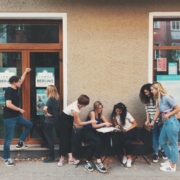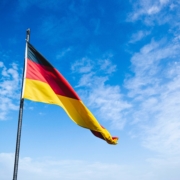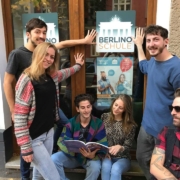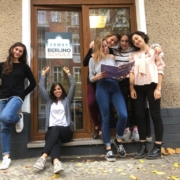Berlino Schule is celebrating 2019 with new interesting German courses: intensive, evening, weekend, private and Skype classes. Don’t skip any of these opportunities!
It is your first time in Berlin, or you have been living in Berlin for quite a lot of time, but you still have the feeling you cannot speak German fluently? Don’t worry. You are neither the first nor the last to experience this. This is why it is extremely important to rely on the right school. Berlino Schule provides you with qualified teachers, who have been teaching German for lots of years. Don’t miss the opportunity to learn “this (not) impossible” language in an international environment!
Berlino Schule has the best quality-price ratio: it can provide you with a proper language education, with qualified and German native teachers from just 4€/hour*. Moreover, whether you are in need of an accomodation, we can help you find the right one for you.
Berlino Schule provides students with three kinds of German course: intensive (morning and afternoon), extensive (evening) and private lessons.
Our German intensive courses
Our intensive courses are held in the morning. Classes will take place 4 times a week, from 8.45 to 11.15 or from 11.40 to 14.20. The course will last four weeks, for a total amount of 48 hours.
Price: 192 euro + 20 euro registration fee
Our German intensive courses – February
A1.1 5 FEBRUARY – 1 MARCH (Tue-Fri 8.45 -11.15)
A1.2 5 FEBRUARY – 1 MARCH (Tue-Fri 11.40 -14.10)
A2.1 5 FEBRUARY – 1 MARCH (Tue-Fri 8.45 -11.15)
A2.2 5 FEBRUARY – 1 MARCH (Tue-Fri 8.45 -11.15)
B1.1 5 FEBRUARY – 1 MARCH (Tue-Fri 11.40-14.10)
B1.2 5 FEBRUARY – 1 MARCH (Tue-Fri 8.45 -11.15)
B2.1 5 FEBRUARY – 1 MARCH (Tue-Fri 11.40-14.10)
C1.2 5 FEBRUARY – 1 MARCH (Tue-Fri 14.30-16.45)
Our German intensive courses – March
A1.1 5 MARCH – 29 MARCH (Tue-Fri 11.40-14.10)
A1.2 5 MARCH – 29 MARCH (Tue-Fri 8.45 -11.15)
A2.1 5 MARCH – 29 MARCH (Tue-Fri 11.40-14.10)
A2.2 5 MARCH – 29 MARCH (Tue-Fri 8.45 -11.15)
B1.1 5 MARCH – 29 MARCH (Tue-Fri 8.45 -11.15)
B1.2 5 MARCH – 29 MARCH (Tue-Fri 11.40-14.10)
B2.1 5 MARCH – 29 MARCH (Tue-Fri 8.45 -11.15)
Our German intensive courses – April
A1.1 2 APRIL – 26 APRIL (Tue-Fri 8.45 -11.15)
A1.2 2 APRIL – 26 APRIL (Tue-Fri 11.40-14.10)
A2.1 2 APRIL – 26 APRIL (Tue-Fri 8.45 -11.15)
A2.2 2 APRIL – 26 APRIL (Tue-Fri 11.40-14.10)
B1.1 2 APRIL – 26 APRIL (Tue-Fri 8.45 -11.15)
B2.1 2 APRIL – 26 APRIL (Tue-Fri 11.40-14.10)
B2.2 2 APRIL – 26 APRIL (Tue-Fri 8.45 -11.15)
Our German intensive courses – May
A1.1 29 APRIL – 24 MAY (Tue-Fri 11.40-14.10)
A1.2 29 APRIL – 24 MAY (Tue-Fri 8.45 -11.15)
A2.1 29 APRIL – 24 MAY (Tue-Fri 11.40-14.10)
A2.2 29 APRIL – 24 MAY (Tue-Fri 8.45 -11.15)
B1.1 29 APRIL – 24 MAY (Tue-Fri 11.40-14.10)
B1.2 29 APRIL – 24 MAY (Tue-Fri 8.45 -11.15)
B2.2 29 APRIL – 24 MAY (Tue-Fri 8.45 -11.15)
Our German intensive courses – June
A1.1 28 MAY – 21 JUNE (Tue-Fri 8.45 – 11.15)
A1.2 28 MAY – 21 JUNE (Tue-Fri 11.40 – 14.10)
A2.1 28 MAY – 21 JUNE (Tue-Fri 8.45 – 11.15)
A2.2 28 MAY – 21 JUNE (Tue-Fri 11.40 – 14.10)
B1.1 28 MAY – 21 JUNE (Tue-Fri 8.45 – 11.15)
B2.1 28 MAY – 21 JUNE (Tue-Fri 8.45 – 11.15)
C1.1 28 MAY – 21 JUNE (Tue-Fri 11.40 – 14.10)
Our German intensive courses – July
A1.1 25 JUNE – 19 JULY (Tue-Fri 11:40-14:10)
A1.2 25 JUNE – 19 JULY (Tue-Fri 8:45-11:15)
A2.1 25 JUNE – 19 JULY (Tue-Fri 11:40-14:10)
A2.2 25 JUNE – 19 JULY (Tue-Fri 8:45-11:15)
B1.1 25 JUNE – 19 JULY (Tue-Fri 11:40-14:10)
B1.2 25 JUNE – 19 JULY (Tue-Fri 8:45-11:15)
B2.2 25 JUNE – 19 JULY (Tue-Fri 8:45-11:15)
Our German intensive courses – August – 3 weeks
A1.1 22 JULY – 9 AUGUST (Mon-Fri 8:45-11:25)
A1.2 22 JULY – 9 AUGUST (Mon-Fri 11:40-14:20)
A2.1 22 JULY – 9 AUGUST (Mon-Fri 8:45-11:25)
A2.2 22 JULY – 9 AUGUST (Mon-Fri 11:40-14:20)
B1.1 22 JULY – 9 AUGUST (Mon-Fri 8:45-11:25)
B1.2 22 JULY – 9 AUGUST (Mon-Fri 11:40-14:20)
B2.1 22 JULY – 9 AUGUST (Mon-Fri 8:45-11:25)
Our German intensive courses – August – 3 weeks
A1.1 12 AUGUST – 30 AUGUST (Mon-Fri 11:40-14:20)
A1.2 12 AUGUST – 30 AUGUST (Mon-Fri 8:45-11:25)
A2.1 12 AUGUST – 30 AUGUST (Mon-Fri 11:40-14:20)
A2.2 12 AUGUST – 30 AUGUST (Mon-Fri 8:45-11:25)
B1.1 12 AUGUST – 30 AUGUST (Mon-Fri 11:40-14:20)
B2.1 12 AUGUST – 30 AUGUST (Mon-Fri 8:45-11:25)
B2.2 12 AUGUST – 30 AUGUST (Mon-Fri 8:45-11:25)
Our German intensive courses – September
A1.1 3 SEPTEMBER – 27 SEPTEMBER (Tue-Fri 8:45-11:15)
A1.2 3 SEPTEMBER – 27 SEPTEMBER (Tue-Fri 11:40-14:10)
A2.1 3 SEPTEMBER – 27 SEPTEMBER (Tue-Fri 8:45-11:15)
A2.2 3 SEPTEMBER – 27 SEPTEMBER (Tue-Fri 11:40-14:10)
B1.1 3 SEPTEMBER – 27 SEPTEMBER (Tue-Fri 8:45-11:15)
B2.2 3 SEPTEMBER – 27 SEPTEMBER (Tue-Fri 11:40-14:10)
C1.1 3 SEPTEMBER – 27 SEPTEMBER (Tue-Fri 8:45-11:15)
Our German intensive courses – October
A1.1 1 OCTOBER – 25 OCTOBER (Tue-Fri 11:40-14:10)
A1.2 1 OCTOBER – 25 OCTOBER (Tue-Fri 8:45-11:15)
A2.1 1 OCTOBER – 25 OCTOBER (Tue-Fri 11:40-14:10)
A2.2 1 OCTOBER – 25 OCTOBER (Tue-Fri 8:45-11:15)
B1.1 1 OCTOBER – 25 OCTOBER (Tue-Fri 11:40-14:10)
B1.2 1 OCTOBER – 25 OCTOBER (Tue-Fri 8:45-11:15)
B2.1 1 OCTOBER – 25 OCTOBER (Tue-Fri 8:45-11:15)
Our German intensive courses – November
A1.1 29 OCTOBER – 22 NOVEMBER (Tue-Fri 8:45-11:15)
A1.2 29 OCTOBER – 22 NOVEMBER (Tue-Fri 11:40-14:10)
A2.1 29 OCTOBER – 22 NOVEMBER (Tue-Fri 8:45-11:15)
A2.2 29 OCTOBER – 22 NOVEMBER (Tue-Fri 11:40-14:10)
B1.1 29 OCTOBER – 22 NOVEMBER (Tue-Fri 8:45-11:15)
B1.2 29 OCTOBER – 22 NOVEMBER (Tue-Fri 11:40-14:10)
B2.1 29 OCTOBER – 22 NOVEMBER (Tue-Fri 8:45-11:15)
Our German intensive courses – December
A1.1 26 NOVEMBER – 20 DECEMBER (Tue-Fri 11:40-14:10)
A1.2 26 NOVEMBER – 20 DECEMBER (Tue-Fri 8:45-11:15)
A2.1 26 NOVEMBER – 20 DECEMBER (Tue-Fri 11:40-14:10)
A2.2 26 NOVEMBER – 20 DECEMBER (Tue-Fri 8:45-11:15)
B1.1 26 NOVEMBER – 20 DECEMBER (Tue-Fri 11:40-14:10)
B1.2 26 NOVEMBER – 20 DECEMBER (Tue-Fri 8:45-11:15)
B2.2 26 NOVEMBER – 20 DECEMBER (Tue-Fri 8:45-11:15)
Look at our calendar to find out our German intensive courses
Our German evening courses
Evening German courses last 8 weeks, for a total amount of 48 hours: classes take place twice a week (Monday and Wednesday or Tuesday and Thursday), 3 hours per day, from 19.15 to 21.40.
Price: 240 euro + 20 euro registration fee
Our German evening courses – January/February
A1.1 7 JANUARY – 27 FEBRUARY (MON and WED 19.15 – 21.40)
A2.1 7 JANUARY – 27 FEBRUARY (MON and WED 19.15 – 21.40)
A2.2 7 JANUARY – 27 FEBRUARY (MON and WED 19.15 – 21.40)
Our German evening courses – February/April
A1.1 12 FEBRUARY – 4 APRIL (TUE and THU 19.15 – 21.40)
B1.1 12 FEBRUARY – 4 APRIL (TUE and THU 19.15 – 21.40)
Our German evening courses – March/April
A1.1 5 MARCH – 25 APRIL (TUE and THU 19.15 – 21.40)
A1.2 4 MARCH – 24 APRIL (MON and WED 19.15 – 21.40)
A2.2 4 MARCH – 24 APRIL (MON and WED 19.15 – 21.40)
B1.1 4 MARCH – 24 APRIL (MON and WED 19.15 – 21.40)
Our German evening courses – May/June
A1.1 6 MAY – 26 JUNE (MON and WED 19.15 – 21.40)
A1.2 7 MAY – 27 JUNE (TUE and THU 19.15 – 21.40)
A2.1 6 MAY – 26 JUNE (MON and WED 19.15 – 21.40)
A2.2 7 MAY – 27 JUNE (TUE and THU 19.15 – 21.40)
B1.2 6 MAY – 26 JUNE (MON and WED 19.15 – 21.40)
B2.1 7 MAY – 27 JUNE (TUE and THU 19.15 – 21.40)
Our German evening courses – July/August
A1.1 2 JULY – 22 AUGUST (TUE and THU 19:15 – 21:40)
A1.2 1 JULY – 21 AUGUST (MON and WED 19:15 – 21:40)
A2.1 2 JULY – 22 AUGUST (TUE and THU 19:15 – 21:40)
A2.2 1 JULY – 21 AUGUST (MON and WED 19:15 – 21:40)
B1.1 2 JULY – 22 AUGUST (TUE and THU 19:15 – 21:40)
B2.1 1 JULY – 21 AUGUST (MON and WED 19:15 – 21:40)
Our German evening courses – August/October
A1.1 26 AUGUST – 16 OCTOBER (MON and WED 19:15 – 21:40)
A1.2 27 AUGUST – 17 OCTOBER (TUE and THU 19:15 – 21:40)
A2.1 26 AUGUST – 16 OCTOBER (MON and WED 19:15 – 21:40)
A2.2 27 AUGUST – 17 OCTOBER (TUE and THU 19:15 – 21:40)
B1.2 27 AUGUST – 17 OCTOBER (TUE and THU 19:15 – 21:40)
B2.2 26 AUGUST – 16 OCTOBER (MON and WED 19:15 – 21:40)
Our German evening courses – October/December
A1.1 22 OCTOBER – 12 DECEMBER (TUE and THU 19:15 – 21:40)
A1.2 21 OCTOBER – 11 DECEMBER (MON and WED 19:15 – 21:40)
A2.1 22 OCTOBER – 12 DECEMBER (TUE and THU 19:15 – 21:40)
A2.2 21 OCTOBER – 11 DECEMBER (MON and WED 19:15 – 21:40)
B1.1 22 OCTOBER – 12 DECEMBER (TUE and THU 19:15 – 21:40)
C1.1 21 OCTOBER – 11 DECEMBER (MON and WED 19:15 – 21:40)
Look at our calendar to find out our German evening courses
Our German weekend courses
Don’t you have time to attend during the week? Our weekend courses are held every Saturday, from 10 to 13.20, for a total amounts of 12 meeting (48 teaching units)
Price: 240 euro + 20 euro registration fee
A1.1 16 FEBRUARY – 4 MAY (every Saturday, 10-13.20)
Our German super-intensive courses (Summer School)
Do you want to give a boost to your summer? Would you take advantage of the summer holidays to improve your German, a language which is getting more and more important in the labour market? Are you looking forward to coming to Berlin, a city full of culture, art and nightlife?
Summer School of Berlino Schule is the study trip you are looking for. If you choose to enroll to our classes, you will have the possibility to attend super intensive courses of 5 hours per day (from Monday to Friday) for 2 weeks, in a lively and international district of Friedrichshain.
That’s not all! Students attending the courses at Berlino Schule will be offered the chance to join in afternoon activities, related to the German language (i.e. cineforum, walking tours, museums, conversation activities, etc) for a total amount of 8 hours per week.
When. Summer School courses will be held from the 8th of July to the 30th of August and will be every 2 weeks: 8-19 July, 22 July-2 August, 5-16 August, 19-30 August, every day, from 14:30 to 18:45.
Price: 230 euro
Our German super-intensive courses – July
A1.1: 8 JULY-19 JULY (Mon-Fri, 14:30-18:45)
A2.1: 8 JULY-19 JULY (Mon-Fri, 14:30-18:45)
B2.1: 8 JULY-19 JULY (Mon-Fri, 14:30-18:45)
Our German super-intensive courses – July/August
A1.2: 22 JULY-2 AUGUST (Mon-Fri, 14:30-18:45)
A2.2: 22 JULY-2 AUGUST (Mon-Fri, 14:30-18:45)
B2.2: 22 JULY-2 AUGUST (Mon-Fri, 14:30-18:45)
Our German super-intensive courses – August
A1.1: 5 AUGUST-16 AUGUST (Mon-Fri, 14:30-18:45)
B1.1: 5 AUGUST-16 AUGUST (Mon-Fri, 14:30-18:45)
C1.1: 5 AUGUST-16 AUGUST (Mon-Fri, 14:30-18:45)
Our German super-intensive courses – August
A1.2: 19 AUGUST-30 AUGUST (Mon-Fri, 14:30-18:45)
B1.2: 19 AUGUST-30 AUGUST (Mon-Fri, 14:30-18:45)
C1.2: 19 AUGUST-30 AUGUST (Mon-Fri, 14:30-18:45)
Look at our calendar to find out our German super-intensive courses
Skype/private classes
We want learning to be accessible to everyone, even if you don’t live in Germany or don’t have the time to come to our school. Our individual and Skype classes are made up for beginners (A1.1) and advanced learners (C1). An attendance certificate will be given to you at the end of your eLearning classes. If you want to take individual classes, no previous knowledge is required. Our flexible schedule will meet your specific linguistic needs and working hours. The attendance will be define with the school.The price is 28 € per hour (45 minutes).
Our teachers
The courses are held by teachers with certified experience in the language teaching field. At the end of the course a certificate of attendance will be released on demand.
Info and registration
Send an email to info@berlinoschule.com and we will reply with all the information you need. Check also our website to know more about Berlino Schule.
Berlino Schule
Gryphiusstraße 23, 10245 Berlin
030 36465765
info@berlinoschule.com









